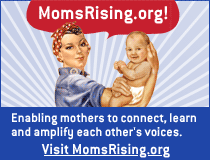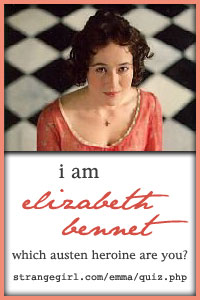 The new Persuasion adaptation was well done. Good actors, photography, and soundtrack. Up until almost the end it conveyed the book's plot and atmosphere quite well in spite of the perhaps unnecessarily fast pace. It does have some serious problems in my point of view.
The new Persuasion adaptation was well done. Good actors, photography, and soundtrack. Up until almost the end it conveyed the book's plot and atmosphere quite well in spite of the perhaps unnecessarily fast pace. It does have some serious problems in my point of view.I was slightly startled when two key utterances by Anne Elliot:
All the privilege I claim for my own sex . . . is that of loving longest, when ... [all] hope is gone.and my favorite quote of all Austen* which is cited by various feminist scholars (and which is paraphrased in the TV adaptation):
Men have had every advantage of us in telling their own story. Education has been theirs in so much higher a degree; the pen has been in their hands.were misplaced and used much earlier in the plot than in the book, in a conversation between Anne and the grieving Captain Benwick at Lyme, instead of at the very end of the book. Captain Wentworth didn't even overhear her saying those things, so they became meaningless utterances instead of the key revelation which gave Wentworth hope that she might still love him. I noticed this change and began to wonder why the screenwriter did that, but it didn't affect the development of the plot, so I kept watching, wondering a bit how the "revelation" of her feelings would take place in the end.
This dislocation was probably used to preserve these famous quotes in the adaptation since the ending was slightly different from the book's. It was too fast paced, literally, with Anne running around in various directions while trying to entertain meaningful conversation and read the most important letter of her life -- very distracting, not to mention that talking and reading while running can hardly be done. Wentworth learned that she was not to marry Eliot (not such a strong suspicion of him in the book) when he came to convey a message of the Admiral that he could vacate the house to her and Elliot. She denies the engagement (the actor's face in this shot was very well done) and the series of interruptions that follow are quite effective in conveying how flustered Anne feels. Their encounter is pretty anti-climatic in the end and a little peeve of mine is that their kiss took too long to happen and ended up looking awkward. This was a little sad because their previous "close encounter" at the shop while raining was very well done.
The actual ending was bizarre to say the least! [SPOILER ALERT] How could he give her Kellynch Hall as a wedding gift when Mr. Elliot remained the rightful heir and would not take possession of it until after Sir Walter died? That was extremely puzzling!
 I previously thought that the Pride and Prejudice movie ending was a bit far fetched (if enchanting), but Elizabeth did go to live in that wonderful estate whereas all we know of Anne was that she became a Navy wife.** Go figure!
I previously thought that the Pride and Prejudice movie ending was a bit far fetched (if enchanting), but Elizabeth did go to live in that wonderful estate whereas all we know of Anne was that she became a Navy wife.** Go figure!I stay with the previous movie even though the actor who portrayed Wentworth is infinitely more handsome in this TV adaptation, that's for sure! :-)
* I'm even using it as an epigraph in my dissertation.
** The previous Persuasion adaptation emphasizes that by having her in the ship with him at the end, a bit of a stretch, but much more accurate. I loved that movie, BTW, but I was mystified by the carnival parade in the streets of Bath after they finally acknowledge their love to each other and kiss. It was quite strange, but then... oh well, film-makers/ screenwriters who resort to book adaptations may want to insert some things from their own imaginations in the films, I guess!












5 comments:
I was so happy you wrote your review so quick because we just finished watching it and I was hoping it would be up soon! And lo! Here it is! I liked the other version better, too, although I don't remember it as well. I remember liking Anne's character more and this time I was really really frustrated/put-off by the running around the streets thing. But still! Fun to watch and am looking forward to the rest. (Brett, I have to add, was disturbed by how much Gillian Anderson is looking like Madonna all of a sudden.)
I just finished watching it, too. And I DVRd it, so may watch it again, since it was so short (which these days is a plus in a movie *groan*). Having never read the book, I don't have anything to compare it to except the previous movie. And I liked it so much more.
What intrigued me most was how much the camera-work did to convey her state of mind.
And, so what did he do, go a buy the house? I don't think it works like that. It was a lovely movie, though, I thought. But then I can be easily persuaded. haha!
I started watching "Persuasion" tonight and just couldn't get in to it. I'm not sure what it is about Jane Austen's work -- I just can never connect with it. ("Pride and Prejudice" is one of my least favorite books ever. I hated it!)
I'd be curious to hear what others find so compelling about Austen. Is there something I'm missing? All of the stories seem like variations on a theme; to me, the books always seemed more like soap operas rather than classic literature. Am I just not getting it?
I absolutely hated this version, and I loved the earlier movie. This one was too fast, the plot was "creatively" dismembered and stuck back tofether like a jigsaw puzzle. And those particular quotes Lilian mentioned were not improved by being shifted earlier.
Without the building tension so beautifully done in the earlier (Amanda Root) version, I found the proposal flat. And I don't believe Anne would have gone tearing around town like she did in the new version. Altogether disappointing.
Tracy, not that I have the answer, but having read all the novels multiple times I can say that for me it is Austen's wit, humor, and wicked eye for social interaction that get me every time. Reading Jane Austen isn't that easy in the modern world - she requires a cup of tea, a comfy chair, and a long stretch of afternoon or evening without distractions. Having said that, though, I find her attitude thoroughly modern.
Thanks for your comment and link on your blog, Diane!
Tracy, I really don't know how to explain my fascination with Austen, but I'll try. From the standpoint of literary history her work is groundbreaking in a sense because she brings in psychological depth to her characters and discusses many aspects of social/personal relationships and the lives of women that were not previously showcased in literature. She is less than a generation removed from the first novelists ever (if one believes Ian Watt's argument that the modern novel originated in England with writers such as Richardson (Pamela, Clarissa) and Fielding (Joseph Andrews) but her work, contrary to theirs, whose novels are extremely long and basically boring, are still relevant today.
You're not too far off mark by saying that they seem to be all variations on the same theme, but that doesn't take away from their originality and each one has a different focus and take on relationships.
Why I love them? Because I think that Austen was a keen observer of people and their behavior and her descriptions of her characters provides us with a great glimpse into human nature. Her humor is also pretty unique. You disliked P&P but that novel's opening lines are quite funny if you come to think of it: "It is a truth universally acknowledged that a single man in possession of a good fortune must be in want of a wife." Isn't that true even today?
"Boy meets girl" stories? Yes, they are, but they also convey the complexity of social relationships of that time and of the "human soul" (that sounds really pompous, but I cannot think of other terms).
I don't know, maybe her language and the plots are just not your style and don't fit in well with your personality, so I guess you're not "missing something."
Well, it's all I can think of right now!
Post a Comment